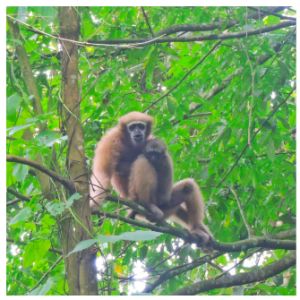Context:
Recently, the first meeting of the Global Gibbon Network (GGN) was held in Haikou, China which discussed the conservation status of India’s only ape.
About Hoolock Gibbon:

- Gibbons are the smallest and fastest of all apes.
- The hoolock gibbon is one of 20 species of apes and is the only ape found in India.
- Habitat: They live in tropical and subtropical forests in the southeastern part of Asia.
- Population: The estimated population of hoolock gibbons is 12,000.
- Threats: Felling of trees for infrastructure projects.
- The Hoolock Gibbon is categorized into two types:
- Both species are protected under the Indian (Wildlife) Protection Act of 1972 and included in Schedule 1.
| Western Hoolock Gibbon |
Eastern Hoolock Gibbon |
- It inhabits all the states of the north-east, restricted between the south of the Brahmaputra river and east of the Dibang river. And outside India, it is found in eastern Bangladesh and north-west Myanmar.
- Majority of Gibbons found in India belong to Western species.
- Conservation Status:
- International Union for Conservation of Nature (IUCN) Red List: Endangered
|
- It inhabits specific pockets of Arunachal Pradesh and Assam in India, and in southern China and north-east Myanmar outside India.
- Conservation Status:
- IUCN Red List: Vulnerable
|
Study on Gibbons:
- American naturalist R. Harlan was the first to describe the hoolock gibbon, characterised by their vigorous vocal displays, from Assam in 1834.
- Over the decades, zoologists thought the northeast housed two species of the ape — the eastern hoolock gibbon (Hoolock leuconedys) found in a specific region of Arunachal Pradesh and the western hoolock gibbon (Hoolock hoolock) distributed elsewhere in the northeast.
- A study led by Hyderabad-based Centre for Cellular and Molecular Biology (CCMB) in 2021 proved there is only one species of ape in India.
- It debunked earlier research that the eastern hoolock gibbon was a separate species based on the colour of its coat.
About Global Gibbon Network (GGN):
- Novel initiative: In 2020, the International Gibbon Day (celebrated on 24th october) event brought together representatives from 20 gibbon conservation organizations. During this event, they launched the Global Gibbon Conservation Network Initiative.
- GGN: The initiative aimed to establish a Global Gibbon Network (GGN) and urged worldwide collaboration for gibbon conservation.
- Organized by: Hainan Institute of National Parks and Eco Foundation Global.
- Aim: To protect and preserve Asia’s unique heritage, specifically the singing Gibbon and their habitats, by promoting participatory conservation policies, legislations and actions.
News Source: The Hindu
![]() 17 Jul 2023
17 Jul 2023
